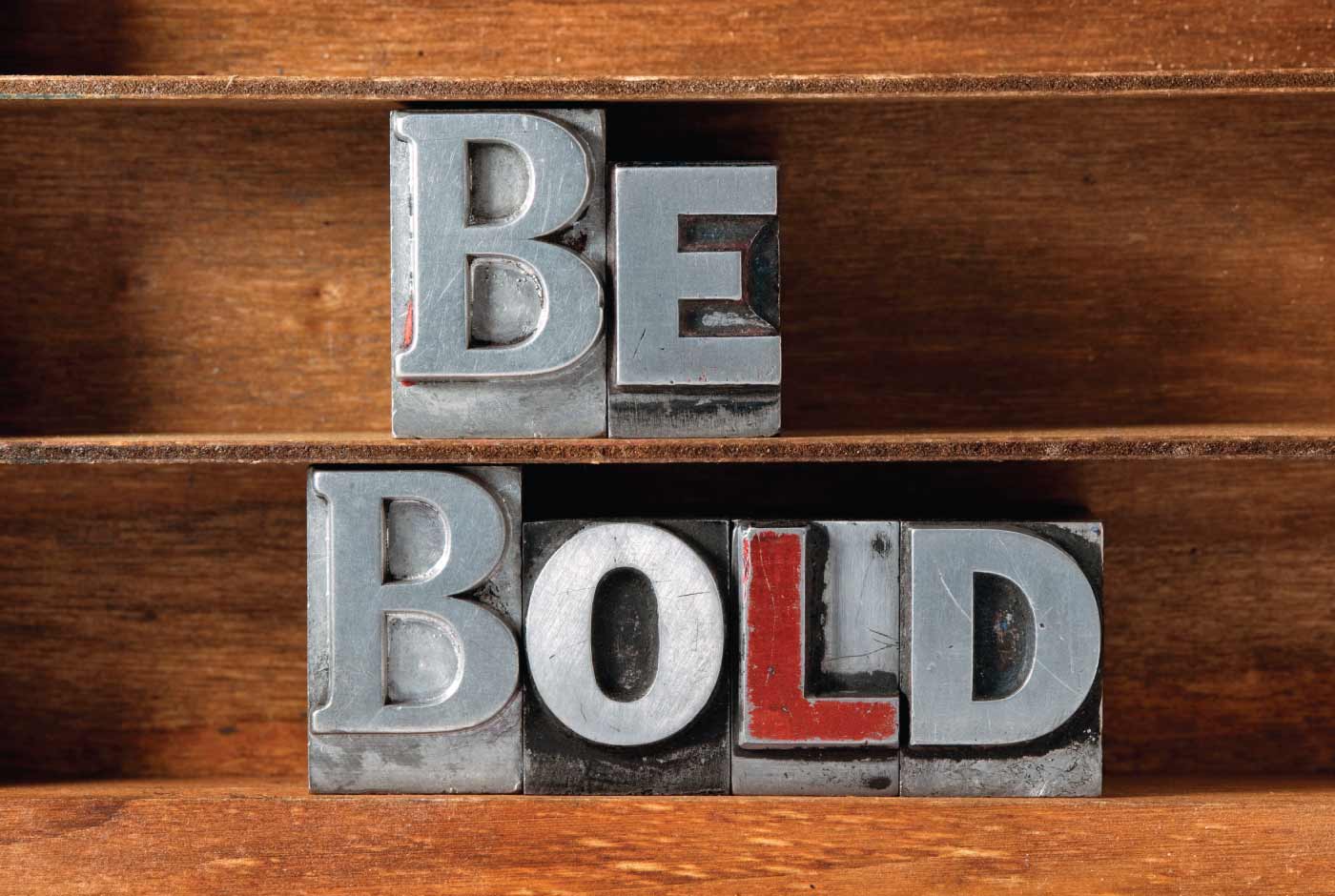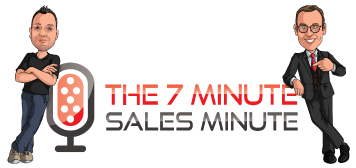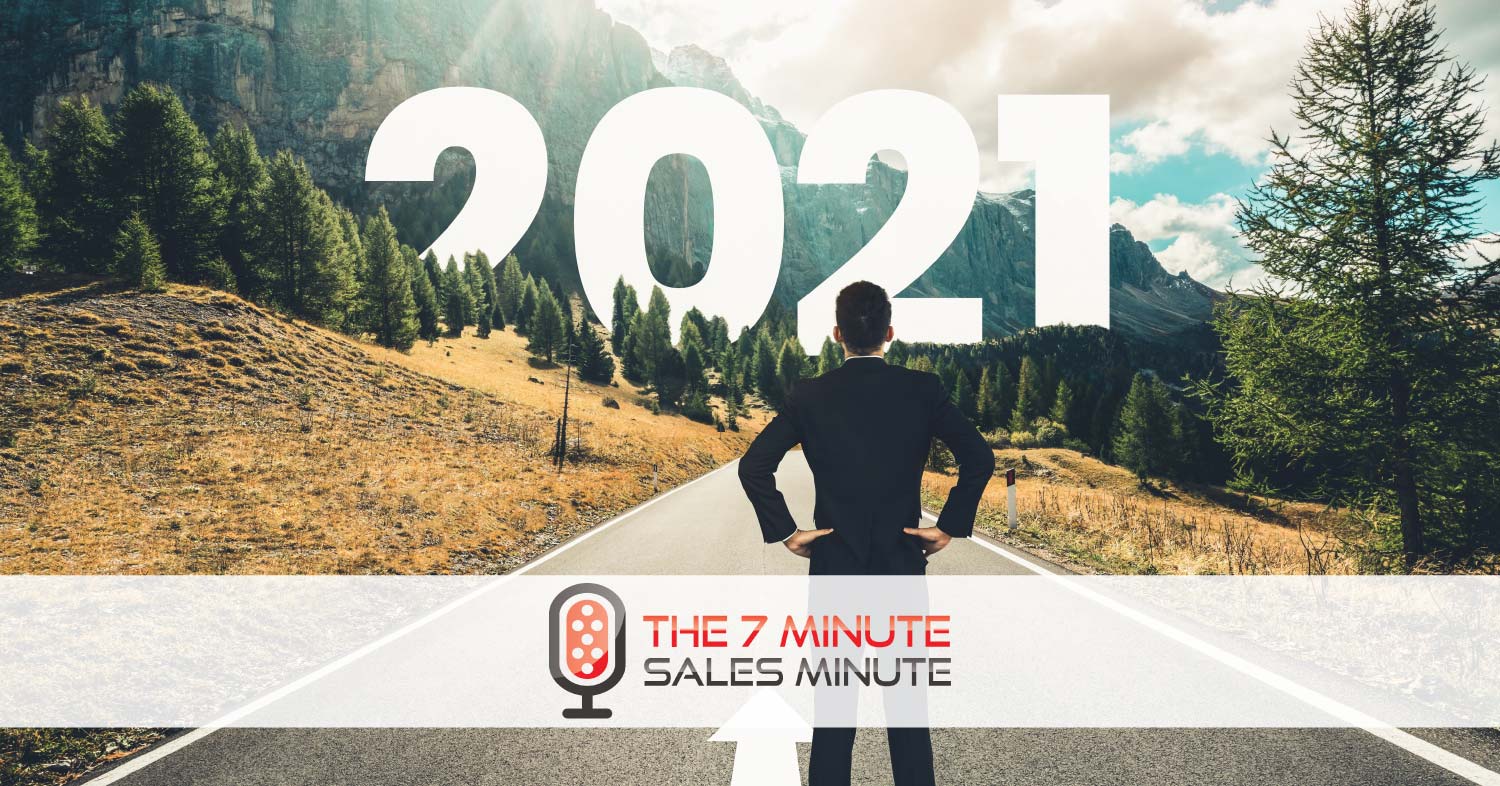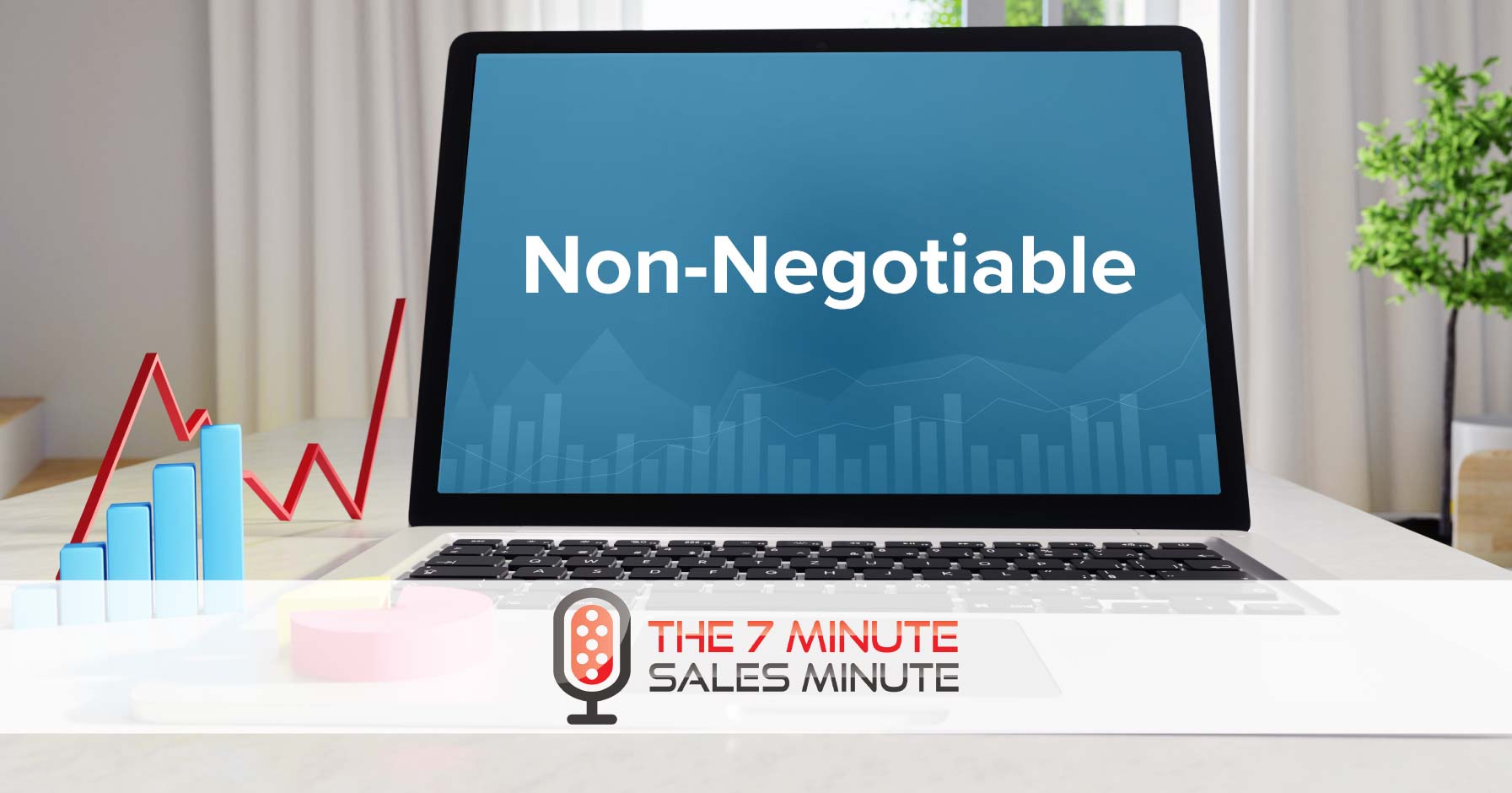
This week the fellas wax philosophic on constantly reinventing yourself.
You’re either growing or you’re dying. Which would you rather do?

Your Evolution Will Not Be Televised
*E - explicit language is used in this podcast.
Read the full transcript
Scott: I’m Scott Fishman.
Jon: I’m Jon Dwoskin.
Scott: This is The Seven Minute Sales Minute.
Jon: Welcome, everybody.
Scott: Hey Jon, what’s up?
Jon: Scott, how are you?
Scott: Doing good man, how are you?
Jon: I’m doing good. I’m doing good. I’m looking forward to season four being completed today.
Scott: Yes.
Jon: We are onto season five after today’s podcast, which is hard to believe, and I’m excited about that.
Scott: Yeah folks, this is the season finale. We promise, no cliffhangers. So what are we talking about today?
Jon: Okay. Today, you know, I saw quotes and I wanted to read it, because it’s in line with what we want to talk about today. By Abraham Maslow. In any given moment we have two options, to set forward into growth or to step back into safety. What we want to talk about today is about stepping into growth and reinventing yourself to grow your business, and really looking in the mirror and figuring out what you’re doing, and what you’re maybe not doing the way you should and as effectively. Making a couple tweaks to grow your business.
Scott: Jon, I like it. What I’m hearing from you right here, which is great, because we’ve had this underlying theme through this whole season, and I don’t think we actually meant it, but it’s been happening. It’s the whole idea of just doing it. Getting things done, moving forward.
Jon: Right. So that’s great. You know, we want to kinda shake everybody out of, not that you’re not hardworking, but we want to shake you out of a little bit of personal complacency, that you may have as you run your days. We want to give you some quick tips, and want to keep it as concise as possible, to just kind of have you examine your day in a way that maybe you haven’t in a couple of days, maybe a couple weeks, hopefully it’s not in a couple years. But, where should we start, Scott?
Scott: I’ll tell you, I think the easiest place to start is questions we can ask ourselves, because …
Jon: Yeah.
Scott: As salespeople, we tend to get – not necessarily into a rut – but we fall into doing the same old thing over and over and over again. Because it’s comfortable, because we tend to go on auto pilot. We just say the same things to every client. We go through the same motions every single day. We talk about having your own personal system. Sometimes that system has to be tweaked. You can’t just do the same thing over and over again.
Jon: Right.
Scott: Some questions that you can ask yourself, first is …
Jon: I just want to say, just want to throw that right before you say that, that is a danger zone. I mean, if anything, as we kick this off, I’m a big to-do person. You should put something, everyone, in your calendar, that every month or every week, whatever business you’re in, you’re changing it up a little bit to prevent yourself, to remind yourself that that’s a dangerous place to be.
Scott: Yes.
Jon: Yeah.
Scott: Stand at the danger zone. Kenny Loggins.
Jon: Yes. Highway to the danger zone. All right, sorry, I didn’t mean to interrupt you. Go ahead.
Scott: No, you’re fine man. I think I’ll kick us off with just a very important question that you can ask yourself. Maybe start off your week this way or say, am I giving it my all? Am I truly giving it my all? Is there anything else I could be doing?
Jon: That’s a great question. Jeff said, kinda on your drive to work in the afternoon, when do you ask yourself that question?
Scott: Honestly, you could ask yourself before your day starts, but I think a great place to start is at the end of a business day, is what did I do today? Let’s look back and take inventory of my day and what could have I done better? Because there has to be something.
Jon: Right.
Scott: Not everybody is running like a racecar in the red all day long. There’s no way you can be as human.
Jon: What went right, what went wrong, what did I accomplish, did I accomplish what I wanted to accomplish?
Scott: Exactly. How could things have played out better. If I had this conversation, how would it have played out? If I said this. You know, figure out what things we can do better every single day.
Jon: You know, I think one of the things that people need to do that they have a hard time doing, is actually slowing down to do that. Carving out the 10 minutes a day at the end of the day and – we’ve talked about this – creating rituals and habits and things of that nature. Slowing down to do that, because I think what you just suggested is critical to reinventing yourself and growing your business. The reflection of that is key.
Scott: Right, take the time, you’re not too busy. We all want to talk about how busy we are, and it’s like a bad thing. Oh, I only got four hours of sleep yesterday. I woke up so early and I’ve been doing this. We run all the time and we really don’t have to. You can carve out that time – like you said – to go ahead and do that self-inventory.
Jon: Right. But talking more about self-inventory and interaction with clients. When we’re interacting with clients and we’re salespeople, so conversions are an important piece of our business. Critical to the growth and closing deals. What are some of the things when we’re, you know, talking to clients on a regular basis and we need to catch ourselves and take it to the next level. You know, shake the complacency out of it.
Scott: Well, I think something big is, am I living up to my brand? Ask yourself that.
Jon: Mm-hmm (affirmative).
Scott: We pitch ourselves to a client as much as we do our product or our service. We like to say how much we’re gonna do for them upfront and where we’re gonna be, how we’re always gonna be there, and they can come to us at anytime. We’re gonna be there for them. Are we really doing that? Are we going that extra mile, are we taking our time to actually help them? Are we checking in with them, even while we have a deal in process or while we’re still negotiating? Are we still giving them little tidbits of information? Letting them know, hey Jon, I was thinking about you, I saw this article, I want you to check it out. Are we living up to the promise that we laid out upfront?
Jon: Spot on. I just want to highlight something that you said, just say it in different words. The follow up is key. It can make and break really any business person, in this case a salesperson. Because if we’re not doing what we said we’re gonna do, when we said we were gonna do it and following up when we need to, when our clients aren’t even expecting us to. That is the key. I would say one of the main differentials from successful salespeople/business people and unsuccessful people. Because, you become unreliable, your brand gets deteriorated and then people lose trust in you. When that happens, you get a bad rep, and everything you worked hard to build your brand, goes from that.
Scott: Right. Along those same lines, we work really hard upfront as salespeople to get people on board. I think something that we fail at sometimes is actually keeping that relationship solid or status quo throughout the process. Sometimes we get someone to say yes, and then they’re just a number to us, and then if they call us with a question, we act annoyed. We can’t do that. We have to give the same service upfront and during the process, after the process, after the deal closes. We’ve got to maintain that same level of service for our clients.
Jon: Right, no, absolutely. Let’s talk about how we service our clients. Because a lot of times, we see salespeople and we may be even guilty of it ourselves. Where maybe they’re too pushy, they’re not too pushy, they need to be pushier. You know, what’s the fine line and how do we self-examine which bucket we fall into, and how to either advance it or pull it back?
Scott: Yeah. Have you ever seen Mean Girls, the TV show, or the movie?
Jon: Yeah.
Scott: That line of, she’s a pusher, she’s a pusher, that reminded me of that. I think we really just need to gauge our clients and our customers. At the end of the day, everybody is different. We say every client is unique – an individual snowflake. We have to tailor our presentation and customize our conversation to match the way they need to be handled. Some people do need us to be pushy. They need us to lead them to water. Some people know exactly what they want and they don’t want us to sell. They just want us to give them the product and give them the pen to sign. It’s all they need, because they’ve already sold themselves, they just want somebody who’s gonna provide the best service.
Jon: And experience. Like you said, know and gauge your client. Pick up on the nuances. If you can sense that they think you’re being too pushy, push back a little bit. I mean, not push back but slow down.
Scott: Right. One of my favorite tricks, and I hate to just say it’s a trick, because I hate to think of sales as a game, like we’re gonna win. But one of my favorite tricks is, I tell people upfront, I’m not pushy. The last thing I’m gonna do is push you into doing business with me.
Jon: Right.
Scott: But I do promise you, if this makes sense for you and I both, I’m going to ask for the business. Then they know that if I actually do close on them, they know, hey, this actually must make sense, because Scott said so. He said he wouldn’t ask for the business, unless it really did make sense. This must be the right thing to do.
Jon: You know, and on the flip side, I – when I was doing sales and dialing a lot – I would leave people messages that said, hey, I know this is my 15th call, but I’m gonna keep on calling two to three times a week until someone calls me and tells me not to.
Scott: There’s nothing wrong with that, right?
Jon: No. I mean, I was tenacious, and I always had the assumption that I had the right to call as long as I told people that. I think for the most part, they kinda liked it. But, yeah, it never got me in trouble. At least, that I know of.
Scott: No, I agree. You have to, if you’re calling you have to leave those messages, too. I’m a firm believer with friendship, like if you call me, I don’t think you need to leave me a message, because I see that Jon called me.
Jon: Right.
Scott: You know, if you leave me a message, it’s just extra time in my day that I’ve gotta go listen to that message, when you’re really just saying hey, give me a call.
Jon: Right.
Scott: The way I think in business, if a client calls me or a customer calls me, and they didn’t leave a message, do they really want a call back? I want to make sure that every time I call a customer – or a prospect, a client – I leave them a voicemail that is not only pertinent but also relevant, and is not the same old thing that I’ve said the last 20 voicemails that I felt. I love the one of gonna keep doing it until you call me back. I love it.
Jon: I love it. I love what you just said too and I want to just highlight one thing. Always leave a message. I mean, it’s the energy behind the message, the newness, the content, make people want to call you back, it’s so easy to press delete today. People have so much to do. If you’re not giving people a reason to call you back, I called a couple people recently, some salespeople back, and their voicemails were so dreary and boring. I didn’t even leave messages back to them, because I thought, I don’t know if I want to even talk to these people. I wait until they call me back. These are people who were pitching me for business. But they’re pitching me for business, and their voicemails are depressing.
Scott: Oh, I love that outgoing voicemail where it’s like, you know, it’s the end of April and they’re like, hey, it’s January 15th, I’ll be out of the office until January 18th, and you’re like, wait a second, it’s April. What’s wrong with you?
Jon: Right. But you’re talking, but listen, you started off talking about brand. Brand is everything that we touched. It’s our voicemails that we leave, it’s our voicemails on our phone. It’s the text messages. It’s the emails that we send out. The emails that we send out – we gotta make sure that there’s no spelling errors, that they’re well written. And, we review them before we just press send. Everything that we do and we touch on today, what we post on social media (we talked a lot about that). -everything is part of our brand. We gotta keep on elevating and looking at our brand, so we can really make a difference.
What we encourage everybody to do is, today – today is Sunday – so whenever you’re listening to this, really take a look at what you’re doing and stop yourself, and take it to the next level. Whatever it is, we talked about a lot of things today, but take it to the next level and change it up a little bit and expand what you’re doing. Otherwise, you know, I used to say when I was managing salespeople: Be bold, not boring.
Scott: Yeah.
Jon: You know, and my step sister, when she was in acting school, she took a class from Mandy Patinkin’s brother, who’s on Homeland.
Scott: The brother or Many Patinkin?
Jon: Mandy Patinkin’s brother. She took a …
Scott: Oh, Stewart. Stewart Patinkin.
Jon: Is that his name?
Scott: No, no idea.
Jon: Anyway, she took an acting class through him and I remember she told me this one, he would always say: It’s better to be an a-hole than a chicken. I’m not encouraging anybody to be an a-hole at all, but what the meaning was, it was, is like push yourself, and be bold, and get out of your comfort zone, and don’t be scared. Just do it and change it up. Hopefully everybody else starts doing that a little bit more than they were before they listened to us today.
Scott: Yeah. One thing I want to add to that. When you’re doing this, don’t just do a self-analysis. It’s great to sit down, look at your own numbers, look at your own game and see what you can fix. But when you do it yourself, you’re also stepping back into comfort. Ask your sales leaders. More importantly, ask your customers what you can change. Get feedback – get a 360 feedback session from everybody you can to see how you can improve. Because you have to get out of that comfort zone and that’s the only way you’re gonna evolve.
Jon: I mean, amen. Get out of your … I think what you just said is perfect, I think it’s a great way to end season four.
Scott: Yes. Everybody, thank you for listening. We’re so excited to bring season five to you, probably in just a couple of days or so.
Jon: Yeah, absolutely.
Scott: Thank you very much and, please, enjoy your week.
Jon: Thanks everybody.



